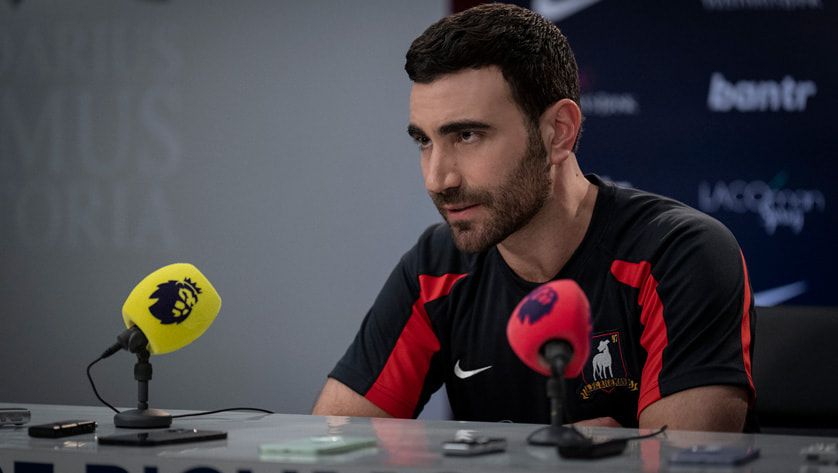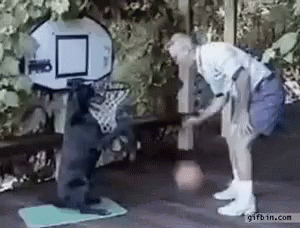Can people change?

Can people change?
- Can I get better at speaking my mind?
- Can I stay calmer when someone annoys me?
- Can I be less buffeted by criticism?
- Can I resist pressuring others to do what I want them to do?
Can people change?
Perhaps.
But it sure is hard.
As they say:
“A leopard can’t change its spots.”
“You can’t teach an old dog new tricks.”

“Can people change?”
Head-like-granite Roy Kent never shows weakness. His body is covered in dark hair so wiry it could scrape a rusty junkyard clean. His outlook is as black as his hair. And his emotional intelligence is outmatched by the average house brick. As a football star, Roy played the role of enforcer. Now, as an assistant coach at AFC Richmond, he makes grown men quake in fear.
So it comes as quite a shock when, in the final episode of Ted Lasso, we hear Roy’s gravel-voice crack:
“Can people change? For the past year, I've busted my f-ing ass trying to change. But apparently, I haven't done f-ing sh-t 'cause... I'm still me.”
It’s like seeing Chuck Norris shed a tear.
Someone stammers a reply…
Did... Did you wanna be someone else?
Roy replies…
Yeah. Someone better… Can people change?
Of course, Roy isn’t just asking if it’s POSSIBLE to change.
He’s asking HOW to do it.
So.
How do people change?
There are more answers to that question than coins in Roy’s swear jar.
- Gain knowledge
- Acquire skills
- Interrogate false beliefs
- Reorder desires
- Adopt new habits
All of these can help a person change. But they’re often not enough. Because there’s a basic part of human functioning that we often neglect, which gets in our way. It’s a reflex that’s so primal that it not only kicks in quicker than our thinking, but it also tends to overpower it. And it drives us to act automatically, in ways that are often outside our awareness and which, with a bit more space to think, we might not choose.
It’s called “emotional reactivity”.
Think about what happens when…
- Your boss demands you do something you don’t want to do
- Your best friend announces they are moving overseas
- Your partner complains you’re not pulling your weight
- You find yourself stuck between two colleagues at work
- Your parent guilts you into helping out
When there is a shift in the balance of a relationship, it can generate an anxious reaction. In much the same way as a careening car or shark fin will ignite a fight, flight, or freeze response, our threat response kicks in.

Our bodies tense. Our minds race. Or go blank. Our focus narrows. Our thinking gets more rigid and less creative. We look for an escape or an excuse or a fix. Someone to blame. Someone to vent to. Anything to ease the tension. And we act without thinking.
This is one reason why we find it hard to change.
It’s hard to access your knowledge, utilise your skills, interrogate your beliefs, reorder your desires or form new habits once your threat response kicks in. Even the most capable and well-intentioned person will struggle to change if they don’t learn to manage their emotional reactivity.
The good news?
Even though a leopard can’t change its spots, you can teach an old dog new tricks.

We can’t escape our instinctive reactions - they’re hardwired into us. But we can learn to navigate them in ways that make small but real differences in how we function under stress.
So how can we do it?
TL;DR
“Emotional fusion” is a concept developed by Dr. Murray Bowen to help explain why some people might be more and others might be less vulnerable to emotional reactivity.
There are two ways to think about emotional fusion and how to reduce it. I find both helpful.
1.The fusion between emotion and thinking
In the push and pull of relationships, we feel unsettled, distressed, uncomfortable, and threatened, and our emotions take over from our thinking. We might know “in our heads” what we should do, but we react in ways that are not consistent with those convictions.

A person with lots of fusion between their emotional and thinking processes has...
“less choice in how they respond to significant challenges. Their behaviour is based more on automatic, internal responsiveness to environmental stimuli” (Robert Noone, 2021)
Notice: More fusion = less choice

So how can we reduce this fusion between our emotional and thinking processes?
Growing our awareness
I have found it helpful to observe how emotional reactivity shows up in my:
- Body: eg. my throat gets tight, my mind starts to buzz, my focus narrows, and I lose perspective.
- Behaviour: eg. I avoid saying what I really think, I try hard to keep people happy, I look for someone to blame, my perfectionism kicks in, and I try really hard to do things exactly right.
- Family of origin: eg. some people in my family would get tense and angry (I would walk on eggshells), others would jump in and smooth things over or rescue (I would do the same), and we would defend each other to the hilt.
The point is this:
And so, one way to reduce the fusion between our emotion and our thinking is to grow our awareness of how emotional reactivity shows up for us.
“Between stimulus and response, there is a space. In that space is our power to choose our response. In our response lies our growth and our freedom.” (attributed to psychologist Victor Frankl)
2.The fusion between others and our "self"
As social creatures, we are all somewhat sensitive to other people and we depend on them to feel ok. But the more fused I am to someone else, the more sensitive I will be to their emotional reactivity.
So, I might hide what I think to keep them happy. Or avoid them. Or blow up at them. Or vent to someone else about them. Or jump in to rescue them (not because they need my help but because helping them calms me).

Michael Kerr explains it this way:
“The greater the percentage of life energy that is prone to be bound in a relationship, the more a person’s functioning will be influenced by and dependent on the relationship.”
Notice: more fusion = less self

So, how can we reduce this fusion between others and our "self"?
Defining my "self"
That sounds abstract. But I've found that when I'm caught up in a challenging relationship or heading into a conversation that I might find difficult, it helps me to write out on paper some principles and responsibilities to guide me.
- Principles: What is important to me, what do I believe, what am I willing to do and not willing to do, how do I want to go about things?
- Responsibilities: What things are mine to do and what things are not for me but for others to do?
Earlier this year, I applied for a ministry role I really wanted and thought I was well suited for. But I often experience such nervous energy in job interviews that I find it hard to express myself clearly - my brain tends to freeze up when I most need it to function well!
So, heading into this interview, I wrote down some principles to guide me. Things like:
- I want God to work in this church community, growing it as people come to know and live for Jesus. He can do that with or without me.
- I want this church to choose the best person for this role. Whether it is me or not.
- I am responsible for honestly communicating my strengths and weaknesses. I don't have to try to convince anyone of anything. I can just be "exactly human-sized" (h/t Steve Cuss)
- The church is responsible for choosing who is most suited for the role. And I can trust God to do his good work even if I think they get the decision wrong.
- I'll be ok whether I get the job or not.
Taking the time to write these out - and to reflect on them before the interview - made a huge difference. I actually enjoyed the interview! And I was able to think on the spot! I even grabbed a whiteboard and started drawing my theory of human change. I couldn't have communicated much more clearly. And so, when I found out a few weeks later that I didn't get the job, I was disappointed. But I was ok.
So, can people change?
Every episode of Ted Lasso begins with Ted sitting in the stadium at AFC Richmond. He’s surrounded by a sea of blue plastic seats, some covered in graffiti. But then, slowly, around Ted, some of those dirty blue seats turn clean and red until they spell out his name across the grandstand.
“Ted Lasso”
Change ripples out from Ted.
He arrives at AFC Richmond to find a club roiling like a coeliac’s stomach. Their coach has been sacked. Their team is losing. Senior players are bullying junior staff. And Richmond’s new owner, Rebecca, is deliberately sabotaging the club to get revenge on her philandering ex-husband, Rupert.
Rupert loves AFC Richmond but handed over ownership of the club to Rebecca as part of their divorce settlement. Now, she’s trying to destroy the club to hurt Rupert. Which is why she hired Ted. An American football coach who knows nothing about English football is doomed to fail.
So when Ted alights from his plane, he steps into this perfect storm of anxiety.
Yet somehow, he stays calm. And dirty blue seats turn clean and red. People start to change. And it's not that Ted intentionally tries to change people. He just tries to stay clear, calm and connected.
By doing that, Ted doesn’t pour fuel on the emotional reactivity at AFC Richmond. And so people around him have a bit more emotional space to be themselves.
This is especially true for Rebecca.
When Ted arrives at Richmond, Rebecca is flooded with emotion. The breakdown of her marriage to Rupert has knocked her off balance. And all her energy is focused on him. She is so bound up in Rupert that all her feelings, her decisions and her hopes are affected by him. Which means she is constantly unstable and acting in ways that are inconsistent with her values.
However, throughout the series, we see Rebecca blossom. By the end of season 3, it is clear she is far more stable in who she is - and far less reactive to Rupert.
Rebecca is growing up. But change doesn’t happen in straight lines.
As she becomes less sensitive to Rupert, she becomes more dependent on Ted. Their beautiful friendship is one of the highlights of the show. And so when Ted announces that he is leaving, returning home to be with his family in the USA, Rebecca is knocked off balance again. In fact, she is so flooded with emotion that it’s a long time before she can bring herself to even broach the subject with Ted.
But finally, we see them. Sitting in Richmond’s grandstand. They are in those same blue seats that change to red at the start of each episode.

Rebecca:
I'm ready to talk about it now. I've decided to sell the club. If you go, I go.
Ted just listens quietly as she tries to make him stay.
There is another option. We both stay. I respect that you need to go home to your son, Ted. But I just want you to consider the possibility that this is your home.
Ted keeps listening. And so Rebecca offers to sell 49% of AFC Richmond so she can afford to give him a massive pay rise.
But Ted still doesn’t change his mind. Finally, she asks him directly.
Would you please stay?
But Ted knows what he wants. He wants to be with his family. He has been neglecting his responsibility as the father of his son. He hopes his broken marriage might be repaired. He cares deeply about Rebecca. But because he is clear on his principles, he doesn’t allow her reactivity to set his course in life.
So, has Rebecca really changed?
It seems like she’s just transferred her emotional fusion from Rupert to Ted. Her feelings, hopes and decisions are bound to him.
Near the end of the episode we see Ted at the airport waiting for his plane. And Rebecca shows up, ticket in hand. It’s a classic rom-com ending.

Ted is shocked:
Now, what the heck are you doing here?
But we’re not surprised. In fact, as much as we want Ted to repair his marriage, aren't we also hoping Rebecca might join him on the plane? Maybe we are caught up in the fusion?
After 3 seasons. The whole series arrives at this point. Ted and Rebecca. At an airport. And nothing can keep her off that plane.
Nothing, except … people can change.
Nothing, except a little less fusion, a little more choice, a little more self.
Rebecca:
I just bought a ticket to get through security so I could come and say a proper goodbye…Ted, you're going home to your family and... I actually want to stay with mine.
Rebecca shows up at the airport as the person she wants to be.
Clear. Calm. Connected.
She shows up not to join Ted but to thank him. And to say goodbye.
And so, blue seats turn red.
Murray Bowen calls that being “differentiated”.
I call it being “like Ted”.
Postscript: Blogging about Ted Lasso has been a blast. But now it’s time to shift gears. I’m going to keep using Bowen theory to write about human behaviour. My hope is that it helps you grow and change. But my next post will mark the beginning of a new series of posts, which will be a bit shorter and a lot more accessible for people who haven’t watched the show. So, if you find it helpful, please share it with your friends. Stay tuned.
So... what has this got you thinking about?
- Who in your life are you most sensitive to?
- Who has the most power to destabilise you?
- How does emotional reactivity show up in your body? In your behaviour? In your family of origin?
- In those relationships where you are most likely to react, how could you try to get a bit more clear on your principles and responsibilities while staying calm and connected?
